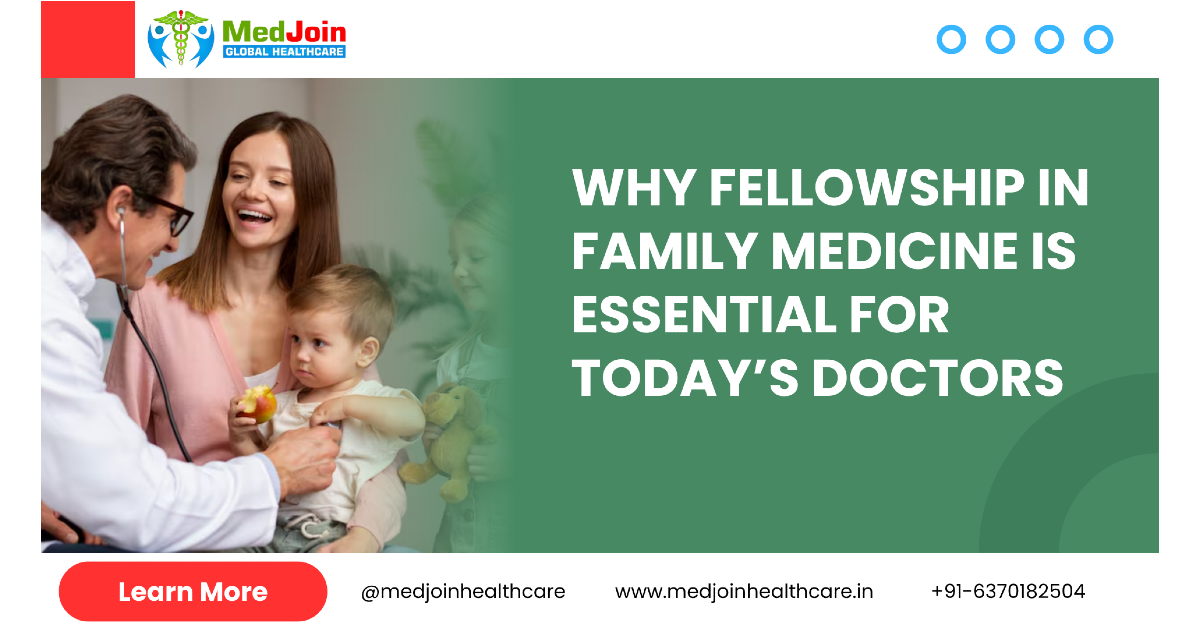
The healthcare landscape is rapidly evolving, and the need for well-rounded, community-oriented physicians has never been greater. Among the various branches of medicine, Family Medicine stands out as the cornerstone of primary care—offering holistic, continuous, and patient-centered care for individuals across all ages and conditions.
A Fellowship in Family Medicine provides medical graduates, especially MBBS doctors, with the advanced clinical, diagnostic, and management skills necessary to excel as primary care physicians. The program bridges the gap between basic medical education and specialized patient care by emphasizing preventive medicine, chronic disease management, and holistic patient interaction.
In today’s world—where healthcare systems are overburdened and patients seek more personalized care—family physicians are increasingly becoming the first line of defense in maintaining community health. This fellowship not only enhances clinical competence but also opens diverse career opportunities globally.
1. Understanding Family Medicine
Family Medicine is a broad specialty focused on delivering comprehensive healthcare services to individuals and families across all stages of life—infants, adolescents, adults, and the elderly.
Unlike super-specialties that focus on a single organ system or disease type, family medicine integrates internal medicine, pediatrics, gynecology, geriatrics, and preventive care into one practice. Family physicians are trained to manage acute illnesses, chronic diseases, and lifestyle-related disorders, while also emphasizing disease prevention and health education.
Core principles of Family Medicine include:
- Continuity of Care: Building long-term relationships with patients and families.
- Comprehensive Approach: Managing a wide spectrum of health issues—physical, mental, and social.
- Community Orientation: Addressing community health problems and preventive interventions.
- Evidence-Based Practice: Applying research and clinical guidelines in day-to-day patient management.
- Patient-Centered Care: Prioritizing patient values, preferences, and shared decision-making.
This broad, integrative nature makes Family Medicine one of the most practical and rewarding fields for doctors who want to make a lasting difference in their patients’ lives.
2. Why Pursue a Fellowship in Family Medicine?
After MBBS, many doctors face a crossroads—whether to pursue specialization, enter clinical practice, or prepare for exams like NEET-PG or USMLE. However, in many cases, doctors spend years preparing for postgraduate entrance exams while missing opportunities for practical clinical exposure.
A Fellowship in Family Medicine bridges this gap by offering structured, hands-on training in clinical settings, allowing doctors to strengthen their diagnostic and management skills while gaining recognized certification.
Key reasons to pursue the Fellowship:
1. Strengthens Clinical Competence
The program trains doctors to diagnose and manage common and complex conditions encountered in outpatient and inpatient settings. It enhances clinical reasoning, prescription writing, and emergency response skills, ensuring physicians can handle real-world challenges with confidence.
2. Holistic and Preventive Care Focus
In an era of lifestyle diseases, mental health challenges, and aging populations, family medicine equips doctors to treat not just diseases but entire individuals. It promotes preventive and promotive healthcare, reducing hospitalizations and improving quality of life.
3. High Global Demand
Family physicians are among the most sought-after professionals worldwide. Countries like the UK, Canada, Australia, the US, and the Middle East highly value family medicine specialists due to their versatility and role in strengthening primary healthcare systems.
4. Excellent Career Flexibility
Family medicine offers multiple pathways:
- Clinical Practice: Work as a general practitioner or family physician.
- Hospital Roles: Serve as a resident physician in hospitals or clinics.
- Public Health & NGOs: Contribute to healthcare programs and rural outreach.
- Academia & Research: Join teaching or clinical research roles.
- Entrepreneurship: Establish a private practice or family care clinic.
5. Addresses Doctor-Patient Trust Gap
Today’s patients expect doctors who understand their history, emotions, and social backgrounds. Family physicians, through continuity of care, build strong bonds of trust and empathy—something often missing in fragmented healthcare systems.
3. Structure and Curriculum of the Fellowship Program
While program structures vary by institution, most Family Medicine Fellowships are designed for MBBS graduates and typically span one to two years, blending theory with practical exposure.
Typical Curriculum Highlights:
- General Medicine: Diagnosis and management of chronic and acute medical conditions like diabetes, hypertension, respiratory infections, and cardiovascular diseases.
- Pediatrics: Growth monitoring, immunization, and pediatric emergencies.
- Obstetrics & Gynecology: Antenatal care, family planning, and reproductive health management.
- Geriatrics: Care of the elderly population, including dementia and age-related disorders.
- Emergency Medicine: Handling trauma, poisoning, cardiac arrest, and other emergencies.
- Preventive & Community Medicine: Health education, screening programs, and epidemiology.
- Behavioral Medicine: Mental health, stress management, and lifestyle counseling.
- Evidence-Based Practice: Clinical decision-making using updated guidelines and case studies.
Training Methodology
- Case-Based Learning: Real patient case discussions.
- Clinical Rotations: Exposure across internal medicine, pediatrics, OBG, emergency, and geriatrics departments.
- Workshops & CME: Skill enhancement in patient communication, diagnostics, and medical ethics.
- Research Projects: Encouragement for publication or case report presentations.
- Mentorship: Guidance from senior physicians and faculty throughout the course.
4. Fellowship in Family Medicine: Bridging the Healthcare Gap
One of the biggest challenges in modern healthcare is the shortage of qualified primary care physicians. Specialists are abundant, but generalists who can coordinate patient care efficiently are limited. This imbalance leads to delayed diagnoses, higher costs, and fragmented treatment.
Family physicians act as gatekeepers of healthcare systems—ensuring appropriate referrals, continuity of care, and early detection of diseases. They are trained to handle a wide range of problems, from common infections to chronic illnesses, while providing emotional and psychological support.
Impact on Healthcare Systems:
- Reduces burden on tertiary hospitals by managing minor illnesses at the primary level.
- Improves health outcomes through preventive care and lifestyle interventions.
- Enhances patient satisfaction via consistent and personalized follow-ups.
- Promotes cost-effective healthcare by reducing unnecessary investigations and hospital admissions.
Thus, a Fellowship in Family Medicine directly contributes to building a more efficient, accessible, and humane healthcare ecosystem.
5. Global Recognition and Career Opportunities
The demand for family medicine specialists extends far beyond India. In many developed countries, family physicians are the backbone of healthcare delivery.
International Outlook:
- United States: The American Board of Family Medicine (ABFM) certifies specialists who undergo residency or fellowship training.
- United Kingdom: General Practitioners (GPs) play a vital role under the NHS, with structured GP training programs.
- Canada & Australia: Family Medicine is a primary route for international medical graduates seeking licensure.
- Middle East & Africa: Rapidly expanding healthcare systems are increasingly hiring family physicians to meet primary care needs.
Doctors completing recognized fellowships gain eligibility for career opportunities abroad, academic positions, and hospital leadership roles.
6. Who Should Enroll in a Fellowship in Family Medicine?
This program is ideal for:
- MBBS graduates who wish to enhance clinical knowledge and start independent practice.
- Doctors preparing for postgraduate exams who want clinical exposure during preparation.
- Rural or community healthcare practitioners seeking structured training and certification.
- Healthcare professionals aiming to work in public health, NGOs, or telemedicine platforms.
- Doctors interested in overseas opportunities in countries valuing primary care training.
The fellowship serves as a stepping-stone toward becoming a competent, compassionate, and confident primary care physician.
7. The Future of Family Medicine
The world is witnessing a paradigm shift from curative to preventive healthcare. With rising incidences of non-communicable diseases (NCDs) like diabetes, hypertension, and obesity, there is a growing emphasis on integrated care models.
Family physicians will play a pivotal role in this transformation—acting as coordinators between specialists, educators for patients, and advocates for public health.
Moreover, advancements in telemedicine, digital health records, and AI-driven diagnostics are empowering family doctors to deliver better care in both urban and rural settings.
Emerging Opportunities Include:
- Telehealth and virtual family practice.
- Preventive and lifestyle medicine clinics.
- Public health leadership roles.
- Integrative medicine and wellness centers.
- Research and academic careers.
As healthcare becomes more community-based and technology-driven, family medicine will continue to evolve as one of the most vital specializations of the 21st century.
8. Benefits of Completing the Fellowship
A Fellowship in Family Medicine offers both professional and personal growth advantages.
Professional Benefits:
- Enhanced diagnostic and patient management abilities.
- Recognition as a certified family physician.
- Broader career scope in India and abroad.
- Increased employability in hospitals, clinics, and corporate healthcare.
- Foundation for future specialization or public health leadership.
Personal Benefits:
- Opportunity to build lifelong relationships with patients.
- Greater job satisfaction due to holistic care approach.
- Flexible work hours and lifestyle balance.
- Ability to contribute directly to community well-being.
9. Why Choose MedJoin Global for Fellowship in Family Medicine
MedJoin Global has emerged as one of the leading platforms offering globally recognized online and blended medical fellowship programs.
Its Fellowship in Family Medicine is specifically designed for practicing doctors and MBBS graduates who aspire to enhance their clinical acumen while maintaining flexibility in learning.
Program Highlights:
- Online + Practical Learning: Flexible digital modules with clinical exposure.
- International Curriculum: Based on global primary care standards.
- Mentorship by Experts: Learn from experienced family physicians and academicians.
- Certification: Earn a recognized credential to boost your professional profile.
- Global Opportunities: Pathway to careers in India and abroad.
Through this fellowship, MedJoin Global aims to create a new generation of skilled, compassionate, and patient-focused family physicians.
A Fellowship in Family Medicine is more than a qualification—it’s a commitment to comprehensive, compassionate, and lifelong care. It equips doctors to see beyond diseases and treat patients as whole individuals, ensuring that communities remain healthy and cared for at every stage of life.
In an era dominated by super-specialization, the role of the family physician remains uniquely vital. With structured training, clinical exposure, and global recognition, a fellowship in this field opens the door to a fulfilling and respected medical career.
Whether your goal is to serve communities, establish independent practice, or build a global career, Family Medicine Fellowship is your gateway to becoming a well-rounded and impactful healthcare professional.






